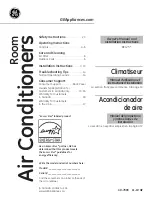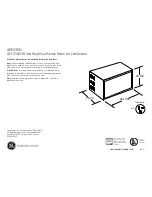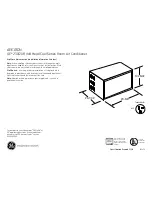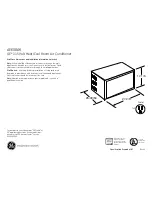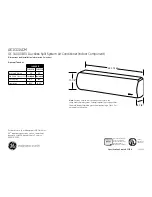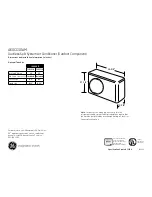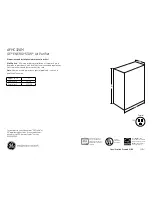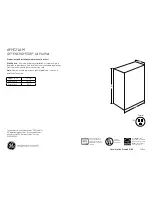
STEP 1 - Indoor Unit (Evaporator)
Find a suitable location.
•
Install the indoor unit on a level & structurally sound wall that is not
subject to vibration.
•
The inlet and outlet ports on indoor unit should not be obstructed; the
air should be able to freely circulate throughout the coverage area.
•
Do not install the unit near a heat source, steam, or flammable
gas/fumes.
•
Do not install unit in direct sunlight.
•
Install the unit where connection between indoor & outdoor unit is as
easy as possible.
•
Install the unit where it is easy to drain the condensed water.
•
Install evaporator at least 4 inches from the ceiling, or 8 feet for high
ceilings.
Summary of Contents for R37GWX
Page 1: ...Ductless Mini Split System Installation ...
Page 4: ...STEP 2 Outdoor Unit Condenser Find the perfect location for the condenser unit ...
Page 5: ...Maximum Height Distances ...
Page 6: ...STEP 3 Remove Mounting Plate from Indoor Unit ...
Page 8: ...STEP 5 Attach Mounting Plate to structure ...
Page 10: ...STEP 7 Install supplied wall sleeve ...
Page 11: ...STEP 8 Prepare Indoor Unit refrigerant piping connections ...
Page 13: ...STEP 10 Guide the line set through the 2 inch hole ...
Page 14: ... Note Refrigerant Pipes ...
Page 15: ...STEP 11 Remove the seal caps from the refrigerant lines ...
Page 17: ...STEP 13 Connect the supplied drain line extension ...
Page 19: ... Note Always keep drain line at the bottom of bundle ...
Page 20: ...STEP 15 Reconnect Indoor Unit to Mounting Plate ...
Page 21: ...STEP 16 Install vibration pads and secure Outdoor Unit ...
Page 23: ...STEP 17 Outdoor Unit Condenser Connection Remove valve cover ...
Page 24: ...STEP 18 Remove seal cap protector ...
Page 25: ... Note Pipe Connection ...
Page 26: ...STEP 19 Connect refrigerant lines to outdoor unit valves ...
Page 27: ...STEP 20 Bleed Purge system using a Vacuum Pump ...
Page 28: ... Note Vacuum Bleeding ...
Page 29: ... Note Vacuum line for 10 to 15 minutes or to 30 microns ...
Page 30: ...STEP 21 Electrical Connection Remove condenser electrical cover ...
Page 32: ...STEP 23 Connect ground to metal plate ...
Page 33: ...STEP 24 Connect line from service box to compressor ...
Page 34: ...STEP 25 Re install the electrical cover ...
Page 35: ...STEP 26 Purge Excess Air Open high side valve turn counter clockwise ...
Page 36: ...STEP 27 Remove service valve cap ...
Page 37: ...STEP 28 Press schrader Service valve for 3 seconds ...
Page 38: ...STEP 29 Open liquid valve completely counter clockwise Note Valve must be fully open ...
Page 39: ...STEP 30 Open suction valve completely counter clockwise Note Valve must be fully open ...
Page 40: ...STEP 31 Check for leaks at all joint connections ...
Page 41: ...STEP 32 Wrap remaining refrigerant line with UV insulation tape ...






















